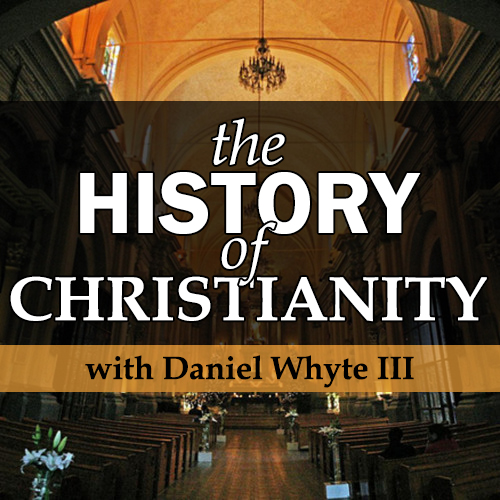This is Daniel Whyte III, president of Gospel Light Society International, with the History of Christianity Podcast #164, titled, “Augustine of Hippo: A Tortuous Path to Faith (Part 5).”
When I became a believer in Jesus Christ, I somehow had the false idea that Christianity began when I got saved. I had no concept of the hundreds of years of history that Christianity had gone through since the time of Jesus Christ over 2,000 years ago. I have found that many believers, young and old, have the same false idea. The purpose of this broadcast is to dispel this notion by sharing with listeners the history of Christianity from the ministry of Jesus Christ all the way up until the present day in an easy-to-understand format. You don’t have to worry: this is not a lecture. This is a look at the basic facts and figures of Christian history that every believer and every person needs to be aware of.
Our Scripture for today is John 3:3 which reads: “Jesus answered and said unto him, Verily, verily, I say unto thee, Except a man be born again, he cannot see the kingdom of God.”
Our History of Christianity quote today is from St. Isaac the Syrian. He said: “As a handful of sand thrown into the ocean, so are the sins of all flesh as compared with the mind of God.”
Today, in the History of Christianity, we are looking at “Augustine of Hippo: A Tortuous Path to Faith (Part 5)” from Dr. Justo L. Gonzalez’s fine book, The Story of Christianity (Volume 1).
After his conversion, Augustine took the necessary steps to embark on a new life. He requested baptism, which he and his son Adeodatus [AH-DEE-OH-DAH-TUS] received from Ambrose [AM-BROZE]. He resigned from his teaching post. And then, with Monica—who had dogged him most of his life, hoping both that he would become a Christian and that he would marry well and advance in his career, Adeodatus [AH-DEE-OH-DAH-TUS] and a group of friends, he set out for North Africa, where he planned to spend the rest of his days in monastic retreat. Monica had persuaded Augustine to dismiss his concubine of many years—whose name he does not even mention. The return to Africa was interrupted at the seaport of Ostia [AA-STEE-UH], where Monica became ill and died. Augustine was so overcome with grief that it was necessary for him and his companions to remain in Rome for several months.
When they finally reached Tagaste [TAH-GHAST], Augustine sold most of the property that he had inherited, gave some of the money to the poor, and with the rest he settled at Cassiciacum [CAS-SEH-SEE-AY-KUM] with Adeodatus [AH-DEE-OH-DAH-TUS]—who died shortly thereafter—and a few friends whose goal was mystical contemplation and philosophical inquiry. Their objective was not the extreme rigorism of the monks of the desert, but rather an orderly life, with no unnecessary comforts, and devoted entirely to prayer, study, and meditation.
It was at Cassiciacum [CAS-SEH-SEE-AY-KUM] that Augustine wrote his first Christian works. They still bore a Neoplatonic [NEE-OH-PLAY-TON-IK] stamp, although he was slowly coming to appreciate the difference between Christian teaching and some elements in Neoplatonism [NEE-OH-PLAY-TON-ISM]. He hoped that the few dialogues he wrote at Cassiciacum [CAS-SEH-SEE-AY-KUM] would be only the beginning of many years devoted to the philosophical life.
Next time, we will continue looking at “Augustine of Hippo.”
Let’s pray.
—PRAYER—
Dear friend, simply knowing the facts about Christian history without knowing the One on Whom this faith is based will do you no good. If you do not believe on the Lord Jesus Christ as your Savior, may I encourage you to get to know Him today. John 3:16 says, “For God so loved the world, that he gave his only begotten Son, that whosoever believeth in him should not perish, but have everlasting life.” Just believe in your heart that Jesus Christ died for your sins, was buried, and rose from the dead by the power of God for you so that you can be a part of the church in this life and in the life to come. Pray and ask Him to come into your heart today, and He will. Romans 10:13 says, “For whosoever shall call upon the name of the Lord shall be saved.”
Until next time, remember that history is truly His story.
All Content & Images are provided by the acknowledged source
